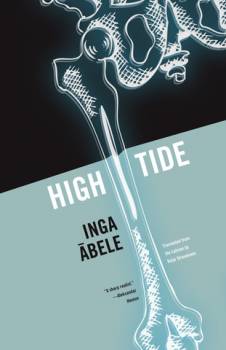The Latvian writer Inga Ābele’s High Tide begins with Ieva ruminating on how fleeting true happiness can be, how thin the veneer on the cold world (you trade the suffering of existence in return for the smell of baking bread”). Then the novel heads back through Ieva’s three decades of life to uncover exactly how she ended up feeling this way. The revelations come – for example, we discover that Ieva’s husband Andrejs was convicted for murder – but the cumulative effect is where Ābele’s novel shines the most for me.
High Tide is told haphazardly – not strictly in reverse chronological order, but something close to that. It goes through a number of different forms and styles: one chapter is entirely in dialogue; one is a series of letters; and so on. One that really struck me is a monologue where we discover that Ieva’s daughter Monta feels distant from her mother and has never been to see her father; the combination of a dense block of text and a breezily informal tone conveys the sense that Monta is desperate to get out of a situation, a state of being, that she may never quite be able to shake off. Kaija Straumanis’ translation is full of these subtle effects.
The overall experience of reading Ābele’s novel, I found, is one of reading in fragments. Because it’s not a smooth reverse-chronological narrative, and because the chapters can’t all be Ieva’s recollections, the book never quite settles into a seamless whole. So one ends up focusing on the individual pieces – appropriately enough, as one senses that this is how Ieva experiences her own life.
Book details (publisher link)
High Tide (2008) by Inga Ābele, tr. kaija Straumanis (2013), Open Letter paperback
Read more of my posts for Women in Translation Month.

Recent Comments